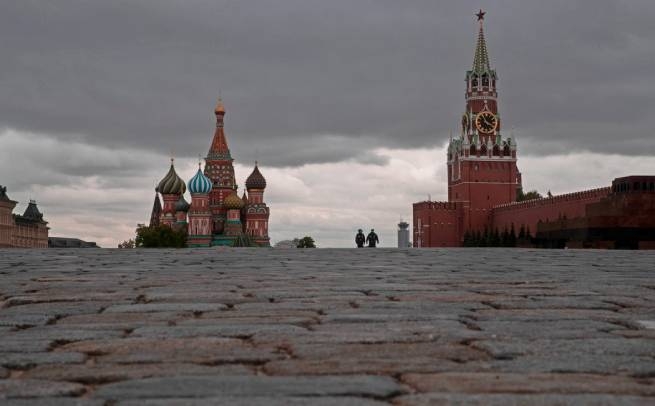A week ago, on March 10, President of Ukraine Volodymyr Zelensky instructed Prime Minister Denys Shmyhal to “comprehensively work through” the petition that received the required number of votes to rename Russia to Muscovy.
In November last year, the possibility of such a renaming was announced by Serhiy Kislitsa, Ukraine’s ambassador to the UN. This demonstrates that the space of symbolic politics and politicization of the past affects not only the 20th and 19th centuries, but also expands much further – in the 16th-17th centuries.
The name “Muscovy” appeared in the XV-XVI centuries among European authors, it quickly became commonly used and was found in various texts and geographical maps. Although the name “Muscovy” was never used domestically, the wording “Moscow state”, “Moscow kingdom” and “Moscow land” were adopted in Russia itself – in the XVI and especially in the XVII centuries. They were used as synonyms for “Russian State” or “Russian State”.
There is an opinion that “Muscovy” is a pejorative * invented by Europeans (primarily Poles) to discredit Russia. In fact, the most “pro-Russian” people spoke and wrote about the “Moscow State”.
In the Commonwealth at the turn of the XVI-XVII centuries. an idea was formed of “Russians” and “Muscovites” as two different peoples, while “Russians” described the East Slavic population of Rech. As part of the Kingdom of Poland, for example, and then the Commonwealth, there was a Russian province with its capital in Lviv. In the 19th century this optic was reinvented by the Polish historian Frantisek Duchinsky and adopted by Ukrainian nationalists, who believed that they should overcome “Muscoviteness”.
Today, the increased relevance of this topic has two main aspects. Firstly, it is the struggle for the symbolic heritage of Ancient Rus’. The Russian Federation is also participating in this struggle, the most striking example being the installation in 2017 of a monument to Prince Vladimir in Moscow. In the symbolic space, “Moscovia”, unlike “Russia”, has nothing to do with Ancient/Kievan Rus.
The second aspect: the name “Muscovy” has other semantic connotations. Russia is largely associated with the Russian Empire of the 18th-19th centuries. Iver Neumann, historian and political scientistfocuses attention: “The name “Russia” and the power of Russia entered the European system of states at the same time” – after the proclamation of the Russian Empire in 1721.
Although there were numerous texts about “Russian/Russian barbarism”, the international status of Russia was fundamentally different from that of Muscovy. Russia was a member country of the Vienna Congress of 1814-1815. – the conference at which the international order of the 19th century was formed, the “Holy Alliance” – a coalition that included all the main European states, and the Entente – associations with England and France on the eve and during the First World War.
The then Russian elite was, on the whole, integrated into the European one – literature, music, painting and ballet were considered “Russian / Russian”. This contrasts strikingly with the “philistine” ideas about Muscovy of the 16th-17th centuries. Francois Rabelais, who referred the “Muscovites” to the unbelievers and, in his carnival manner, listed “Muscovites, Indians, Persians and Troglodytes” can be considered a striking example of such ideas.
The Muscovy Thesis has three key objectives:
- Firstly, this is the desire to position itself as “true Rus'”. As far back as 2021, Ukrainian political speaker Aleksey Arestovich proposed to rename the country to “Rus-Ukraine”, and although this was trolling, such a vision has significant roots in the history of Ukrainian nationalism.
- Secondly, the desire to deprive the modern Russian Federation of the status of “great power” (great power) and “empire”, associated with the name “Russia”.
- Thirdly, this is an attempt to exoticize the Russian Federation and symbolically exclude it from Europe, since “Muscovy” of the 16th-17th centuries was a more “barbaric” and “unknown” country for Europeans than “Russia” of the 18th-19th centuries.
President’s statement Vladimir Putin’s Russia about “Ukraine, created in a very crude way by Lenin and his associates,” really opened a Pandora’s box of political appeals to the past at the state level. And the Thesis on Muscovy demonstrates that not only the Kremlin can play this game.
According to the official representative of the Russian Foreign Ministry Maria Zakharova, the instruction of the President of Ukraine Volodymyr Zelensky to study the possibility of renaming the Russian Federation proves attempts to create “anti-Russia”, quotes TASS:
“The bunker (President of Ukraine Vladimir Zelensky – TASS note) proves our case every day. Here is another evidence of an attempt to create “anti-Russia” from Ukraine.
Such assignment, writes the Russian agency, Zelensky gave it, as the petition gained the 25 thousand signatures necessary for its consideration. The President asked Shmygal to study how possible this renaming is in the historical and cultural context, and what international legal consequences it may have. The petition also proposes to replace the words “Russian Federation” with “Moscow Federation”, “Russian” with “Moscow”.
*Peyorative, or pejorative vocabulary, also derogative – words and phrases expressing a negative assessment of something or someone, disapproval, censure, irony or contempt. Wikipedia.







More Stories
Hurriyet: “Greece asked Turkey for permission to lay cable – Turkish jurisdiction recognized”
France: 'Chaos' on trains and metro. Airport evacuated. Dozens of attacks on athletes and tourists
What's Happening to America's Presidential Candidates (Video)